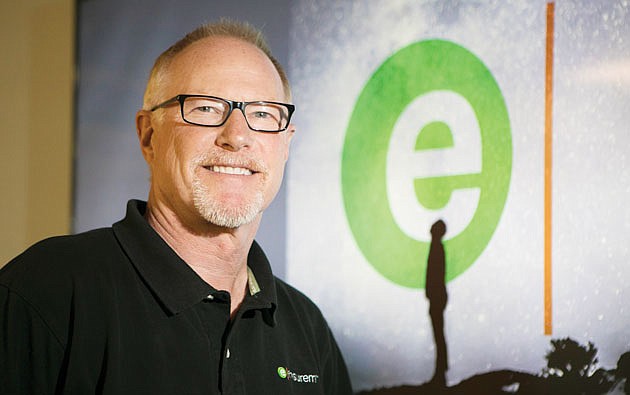- November 24, 2024
-
-
Loading

Loading

David Rich has a wealth of ideas about how to disrupt the insurance industry.
Coming from two decades running units at large insurance companies, including Amerilife Group LLC and Great American, Rich says the first step is to recognize the sector suffers from prolonged groupthink. “The industry is so old and antiquated in how we do things,” Rich says. “They've been doing it this way for 150 years.”
Rich is in the early stages of leading his own disruption, through his Largo-based startup, Ensurem LLC. One part of the company is a digital storefront for individuals to research, shop and purchase life insurance policies, supplemental health coverage and other insurance-related products, including pet insurance. Another part is to provide third-party administrative services for insurance companies, including back-office support. A third part is to do digital marketing for insurance companies — the ultimate in old guard meets the new generation.
Ensurem makes money from all three parts of the business. It doesn't administer or underwrite policies, but its licensed insurance specialists write policies that are sold through insurance companies.
Founded in 2016, Ensurem is part of the burgeoning insurtech sector, a cousin of fintech, or financial technology. The World Insurance Report, published in September by financial services nonprofit Efma and consulting firm Capgemini, found that 31% of respondents relied on insurtech firms in some way to make an insurance purchase. Multiple insurtech firms have recently attracted interest from private equity investors.
Ensurem's capital comes from two sources. First, it received $1.7 million in an angel investment round, led by San Francisco-based AngelRush. In early October, it received a $12.25 million commitment from an affiliate of A-CAP, a New York City-based insurance holding company specializing in life and health insurance and related services.
Rich says the key is to use the capital wisely, for marketing, branding and hiring. On the last point, the 13-employee company seeks to hire six or seven more people, mostly in content production roles for the website. Other jobs are available in software and technology. “The big thing now is executing the plan,” says Rich. “We have lots of analytics to show us what works and what doesn't work.”
Ensurem works, says Rich, by creating a “why” behind people's decision to buy life insurance, a process traditionally cluttered with confusion and indecision. The Ensurem why, says Rich, is to create wealth, or at least opportunities to maintain income stability, for a family that lasts beyond life's unexpected happenings. Says Rich: “We want to inject capital into society, one family at a time.”
The company gets to the why through its active social media channels and a glossy, trademarked blog it calls Awaring America, where posts are mostly life and health insurance tutorials. “We build out the content to make it easier to understand the products,” says Rich. “If we get a family to understand the why, we will hit our sales targets.”
Those targets, says Rich, include reaching $16 million in premiums by year two, 2018, and $85 million in premiums by year five, 2021.
Rich, 61, saw the need for a technological disruption in insurance toward the end of his 20-year run in corporate executive roles with industry giants. That need, particularly in life insurance, has only been exacerbated by another lingering situation: Life insurance agents, the good ones with the industry knowledge and experience, are aging — and willing replacements are scarce. “There's not going to be enough agents to knock on all the doors,” Rich says.
But there is hope. “Insurance companies are starting to recognize the need to change,” he says. “Some companies know they need to change but they don't know how. We have billion-dollar brands coming to us and saying, 'Please help us.'”
One challenge, says Rich, is the industry has been slow to embrace a direct-to-consumer approach, and few companies have tried to push things like Ensurem. “I think it's a matter of timing,” says Rich. “I hope we are not too soon.”